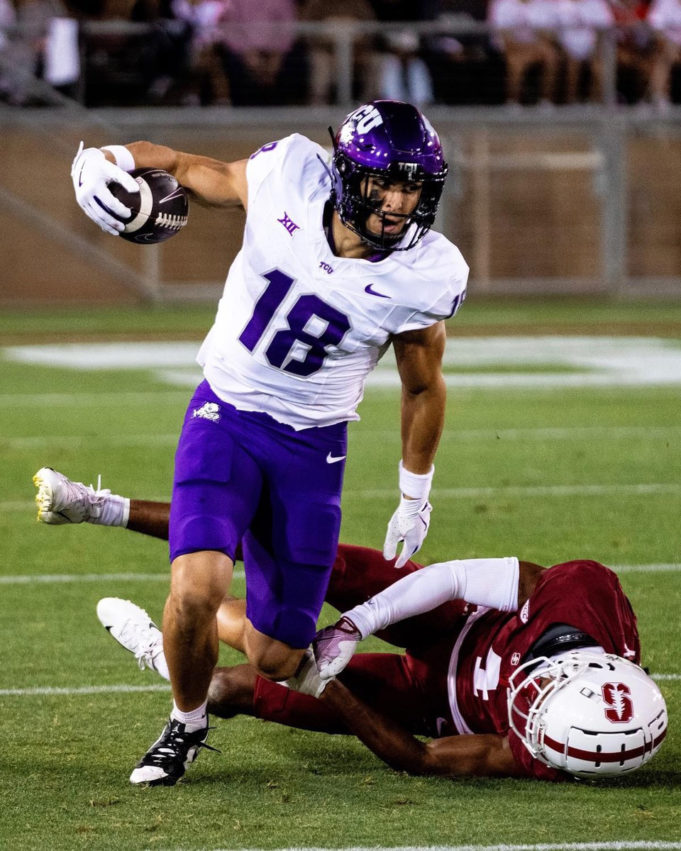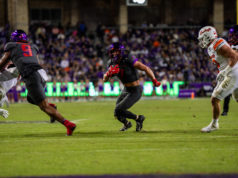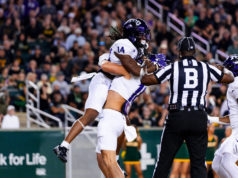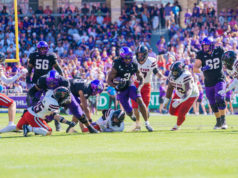I’m no spring chicken anymore. As an elder millennial, staying up until 1 a.m. to watch a horrible on-field performance like TCU’s against Stanford last Friday is an affront to both my pre-geriatric sleep schedule and my energy levels the following day. TCU won, but I wouldn’t label the result a payoff for suffering into the wee hours of Saturday morning.
Instead, it was a Charlie Brownian “good grief” exasperation of escaping California with the first win of the season (and the fourth consecutive over the Cardinal).
Aside from an opening drive in which Savion Williams announced his arrival onto the Big 12’s most dangerous receivers list, the entire first half was dreadful. TCU’s defense — which already looks undeniably improved over last season — kept Stanford in first downs by committing penalties with the brainiacs backed into third-and-forever situations.
The first quarter was a slog all around as the teams combined on nearly 14 minutes of possession for the corresponding quantity of points on the first two drives of the contest. Frog veteran receiver JP Richardson fumbled on the next drive. TCU turned the ball over on downs, knocked in a field goal, and then muffed the handoff exchange on the final drive of the half in the shadow of Stanford’s goal line for a whopping 10 points to the Cardinal’s 17.
Despite not gaining a lead until nearly the fourth quarter, accumulating 100 yards in team penalties to their opponent’s 24, and needing to survive an onside-kick attempt, TCU won a game against another Power 5 team, which is more than most teams in the country attempted this weekend save for the marquee matchups.
The obvious concerns are ball security (three fumbles, two lost) and many poorly timed penalties. Those fixable problems overshadowed what was an overall excellent performance by both major phases of the game. Sophomore Josh Hoover tossed for 353 yards, looked confident, and made mature decisions, though he’s still locking onto receivers much too early in his progressions.
Williams looked dominating in the first half. He contracted a case of the yips to start the second with a pair of drops, but he finished as the go-to guy, requiring lots of defensive attention. Josh Bech emerged as the lightning rod, gaining 139 yards on six receptions to finish as the most productive receiver ahead of Richardson, who hauled in six as well for 107. The trio of Williams, Bech, and Richardson combined for 331 yards and confirmed my suspicion that they would be the stalwarts of the offense this season.
Carrying 20 times for 81 yards, Cam Cook plays differently from the tall, dominating straight-line RBs Frog Nation has become accustomed to in recent years. Cook is a bursty scat-back adept at maneuvering in tight spaces within the tackle box. I’ve yet to see his open-field speed leave the secondary behind, but his burst and drive are going to gain yards in situations where he shouldn’t, and as his patience improves, so will the Frogs’ rushing production.
The defense at large settled in after the first half, committing fewer bonehead penalties and eventually cutting off the scrambling ability of Ashton Daniels, who never found consistency in the passing game and was picked off once. The QB was hurried in the pocket most of the night and sacked four times.
Head Coach Sonny Dykes was his typically reserved self, generally barking at officials over 50/50 personal foul calls rather than berating his own team. For the first three quarters, he stood the way I do in just about any public place when I’m with my three sons: arms crossed with a face saying, “I don’t know what the hell ya’ll are doing right now.”
Aside from the obvious concerns, offensively the Frogs look better between the 20s than in the red zone. Still, it was encouraging to see a pair of under-center snaps: one, a sneak by Hoover for a touchdown; the other, when freshman QB Hauss Hejny from Aledo entered the game for a series. Hejny handed the ball off to the fullback for a first down and also scrambled successfully, displaying his obvious athleticism and potential to be a wildcat-type who can contribute throughout the season. The strategy of involving newcomer Hejny is multifaceted. Not only does it give opponents another something to prepare for, but it says that highly recruited quarterbacks, which he was, are less likely than ever to just sit an entire season and can remain with the team despite ubiquitous transfer options.
TCU’s offense and defense connected the dots when they mattered most this week, in the fourth quarter. If you’ll recall, the opener against Colorado last season was similar, when the Frogs had opportunities to notch a win in the final quarter but just couldn’t. Granted, the Buffaloes rostered some individually talented athletes, which complicated the process, but this revamped 5-7 squad seems to know what it takes to win despite a litany of mistakes.
Next week’s Saturday night showcase should be a much tamer affair as the Long Island Sharks of the Northeast Conference swim their way down to the Fort for their paid shellacking. The Sharks lost their opener at Albany and should be an easy victory at the Carter. FCS opponents rarely upset their hosts, but Texas Tech was reminded just how quickly arrogance conflated into confidence can deliver humility, as Abilene Christian pushed the Red Raiders to overtime in Lubbock. There is no logical reason the Sharks should compete with Dykes’ Frogs. Famous last words.












